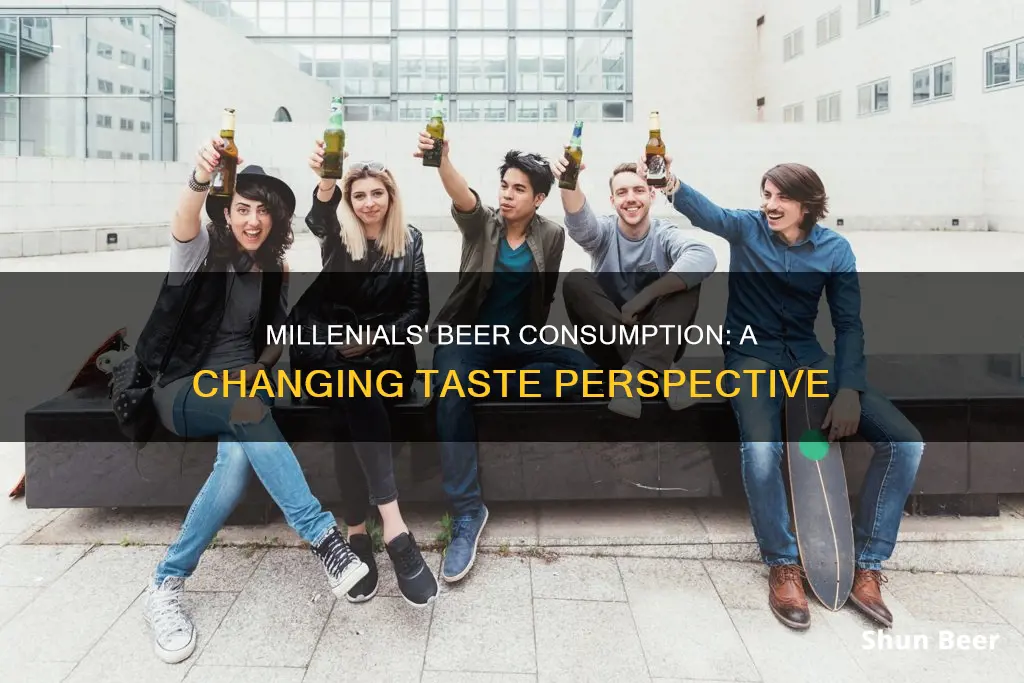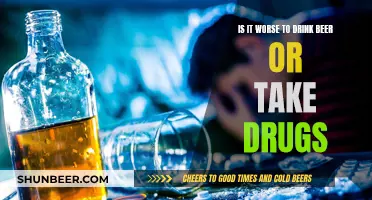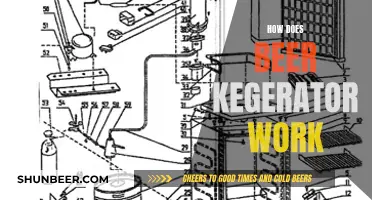
Millennials and Gen Z are drinking less alcohol than previous generations. While this doesn't mean they are teetotal, their drinking habits are having a significant impact on the alcohol industry. Both generations are forcing the industry to diversify its range of alcohol-free options and change its marketing strategies.
What You'll Learn

Millennials are drinking less than older generations
A 2018 report found that millennials drank 20% more per capita than Gen Z, who are drinking less alcohol than previous generations. A survey of 3,400 millennials and Gen Zers found that 57% would rather go to the gym than to a bar, and 69% find heavy drinking culture boring.
Millennial drinking habits are also changing. While beer is the most popular drink of choice for this age group, with 34% drinking it at least twice a month, the frequency of drinking has changed. Drinking beer multiple times a week has become less popular, with 25% now drinking beer once a month or less. Wine is the second most popular drink, with a quarter of older millennials drinking it at least once a week to twice a month.
There are several reasons for this shift. Health consciousness and cutting calories are the most common reasons cited for drinking less. Other reasons include health conditions, financial and budgeting restrictions, and replacing alcohol with marijuana.
The shift in drinking habits has impacted the alcohol industry, with sales of alcohol-free beers and spirits rising. Alcohol brands are working to diversify their range of alcohol-free options, and adjust their branding to set themselves apart from competitors. Several large beer companies in Europe and the US have promised to include non-alcoholic beer in their portfolios by 2025.
The COVID-19 pandemic may also have contributed to the decrease in drinking among young adults. A study by Carnegie Mellon University found that heavy-drinking adults under 30 consumed 12.8 fewer alcoholic drinks per month during and after the pandemic, mainly due to drinking less on weekends.
Beer and Ayurveda: Is It Safe to Drink?
You may want to see also

They fear losing control and how this will appear on social media
Millennials and Gen Z are drinking less than their older counterparts. They fear losing control and how this will appear on social media. This fear has resulted in them consuming less alcohol than their parents' generation did as teenagers and also drinking less than their parents are drinking today.
Gen Z, in particular, is the first generation to prefer other alcoholic drinks to beer. They are also drinking less than millennials. A 2018 report found that Gen Z drank over 20% less per capita than millennials. The report also found that 64% of Gen Z respondents said they expected to drink alcohol less frequently when they got older than older generations do now.
This shift in drinking habits is not just a phase, either. Millennials and Gen Z have forced the alcohol industry to revamp how and what they market and sell. There has been a significant shift in what bars serve, with the establishment of dry venues.
The fear of losing control and how this will appear on social media is a key factor in the drinking habits of millennials and Gen Z. This generation highly values image and control. 49% of Gen Z claims their online image is always at the back of their mind, and 76% feel it is important to be in control of all aspects of their life. This mindset influences their drinking habits, as they are cautious about the potential negative consequences of losing control while under the influence of alcohol.
Social media plays a significant role in the lives of millennials and Gen Z, and they are conscious of how their actions may be perceived and judged by others online. They are also prioritizing productivity and success, with work and university performance taking precedence over socializing. This shift in values has contributed to a decrease in alcohol consumption, as they view drinking as a hindrance to their goals and aspirations.
In conclusion, the fear of losing control and the potential negative impact on their social media image are significant factors in the drinking habits of millennials and Gen Z. This has led to a notable shift in the alcohol industry, with a decrease in alcohol consumption and the rise of non-alcoholic and low-alcoholic alternatives.
Wine-Soaked Romans: Ancient Drinking Habits Revealed
You may want to see also

They prioritise health, productivity, and success over drinking
Millennials and Gen Zers are embracing sobriety and drinking less than their older counterparts. They are prioritizing health, productivity, and success over drinking, with 57% saying they would rather go to the gym than to a bar, and 69% finding heavy drinking culture boring.
This shift in drinking culture has forced the alcohol industry to revamp its marketing and sales strategies, with a focus on alcohol-free and low-alcoholic options. The rise of the "sober curious" movement, where people explore alcohol abstinence, has gained popularity among these generations, with hashtags like #sobercurious and #dryjanuary trending on TikTok.
Gen Z, in particular, has gained recognition for limiting their alcohol consumption, with around a third of people aged 18-24 not drinking alcohol at all. They view alcohol as an occasional treat rather than a regular refreshment, and prioritize their mental and physical health. Almost two-thirds of Gen Zers worry about the emotional impact of alcohol and are mindful of the nutritional content of their drinks, opting for low-calorie options.
Millennials, on the other hand, are also drinking less but not giving up alcohol entirely. They are moderating their drinking habits and seeking a healthier relationship with alcohol. For example, they may limit how much they drink when they go out or replace alcohol with other substances like cannabis.
The decline in drinking among these generations has had a significant impact on the alcohol industry, with sales of alcohol-free beers and spirits rising. Beverage companies are diversifying their ranges to include non-alcoholic options and innovative branding to appeal to these generations.
Beer Overload: Clogged Throat and Health Risks
You may want to see also

They are drinking less beer over time
Millennials and Gen Zers are embracing sobriety over alcohol consumption. They are drinking less beer over time.
A survey of 3,400section break]
Millennials and Gen Zers about their drinking habits found that 57% would rather go to the gym than to a bar, and 69% find heavy drinking culture boring. This shift in drinking culture has forced the alcohol industry to diversify its range of alcohol-free options and adjust its marketing strategies.
Several factors contribute to the decline in beer consumption among millennials:
- Health consciousness: Many millennials cite health concerns and calorie-cutting as the main reasons for reducing their alcohol intake. They are aware of the negative health impacts of excessive drinking and are prioritizing their physical and mental well-being.
- Cost: Drinking less alcohol is often a financial decision, as alcoholic beverages can be expensive. Millennials are also behind their forebears in terms of wealth accumulation, so they may opt for cheaper non-alcoholic alternatives.
- Social media and image consciousness: Millennials and Gen Zers fear losing control and how their actions may appear on social media. They prioritize productivity, success, and maintaining a positive online image.
- Alternative substances: The normalization and legalization of cannabis have provided an alternative to alcohol for some millennials. However, Starke, an addictions therapist, notes a worrisome interest in other drugs, such as opioids and benzodiazepines.
- Socializing alternatives: Millennials are finding alternative ways to socialize that don't revolve around alcohol. For example, they may opt for museums, cafes, cinemas, or juice crawls instead of bars.
The trend of reduced beer consumption among millennials has had a significant impact on the alcohol industry. Alcohol-free beers and spirits are becoming increasingly popular, with some large beer companies promising to have alcohol-free options account for 20% of their global portfolio by 2025. The industry is adapting to meet the changing preferences of younger generations.
Beer and Bladder Infections: Is There a Connection?
You may want to see also

They are more likely to drink alcohol-free beers
Millennials and Gen Zers are embracing sobriety and drinking less than their older counterparts. This has forced the alcohol industry to diversify its range of alcohol-free options. Sales for alcohol-free beers and spirits are high and continue to rise, meaning there is a sobriety revolution occurring and brands are taking note.
Several large beer companies in Europe and the US have promised to fill at least 20% of their global portfolio with non-alcoholic beer by 2025. This means that soon, sober-curious beer drinkers will have a market catered to them with many options.
The shift towards non-alcoholic beverages is driven by younger generations staying away from alcohol. Millennials and Gen Zers are more health-conscious and place more importance on image and control. They are also more likely to prioritise productivity and success, and view binge drinking as a "very risky" activity.
Millennials are less likely to drink than older generations. Research shows that 53% of millennials said they consumed alcohol in the past month, compared with 65% of Gen Xers and 72% of Boomers. Additionally, three out of four millennial drinkers say they limit how much they drink most of the time they go out, and 38% say they moderate their alcohol intake every time.
Gen Z, in particular, is the first generation to prefer other alcoholic drinks to beer. They are also less likely to prioritise spending on alcoholic drinks for the home compared to older generations. Instead, they are opting for sober socialising and choosing low- and no-alcohol drinks that offer potential health benefits, such as lower calorie content and added functional benefits.
Beer, Cigarettes, and ED: Is There a Link?
You may want to see also
Frequently asked questions
No, they do, but they are drinking less than previous generations. Beer is the most popular drink of choice for millennials, with 34% reporting drinking it at least twice a month and 1/5 drinking it twice a week or more. However, frequent beer drinking has decreased over the years, with 25% of millennials now enjoying a beer once a month or less.
There are several reasons why millennials are drinking less beer. One reason is health consciousness and cutting calories. Other reasons include health conditions, financial and budgeting restrictions, and replacing alcohol with marijuana.
Gen Z is drinking less alcohol than previous generations and is the first generation to prefer other alcoholic drinks to beer. They are also more likely to choose low- and no-alcohol drinks due to their lower calorie content, added functional benefits, and lower cost.
The alcohol industry is responding to the decrease in drinking among millennials and Gen Z by diversifying their range of alcohol-free and low-alcoholic options. Several large beer companies in Europe and the US have promised to include non-alcoholic beer in their portfolios by 2025. Bars and pubs are also adapting by offering alcohol-free cocktails and hosting events that provide unique, social, and competitive experiences beyond just drinking.







